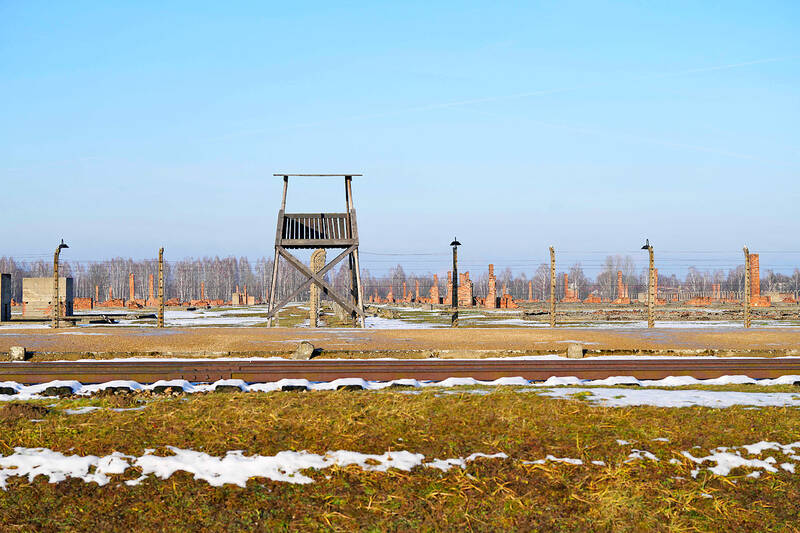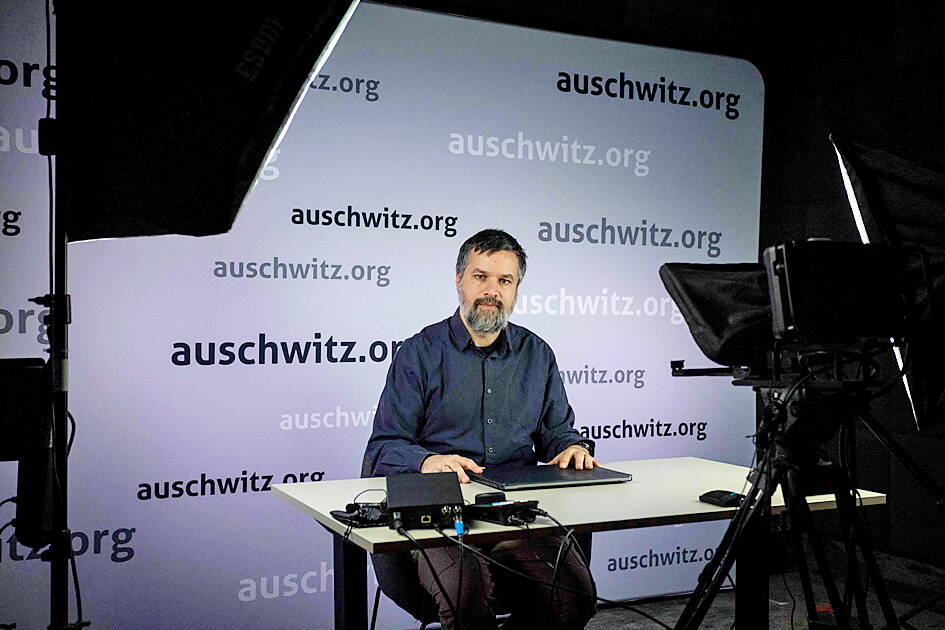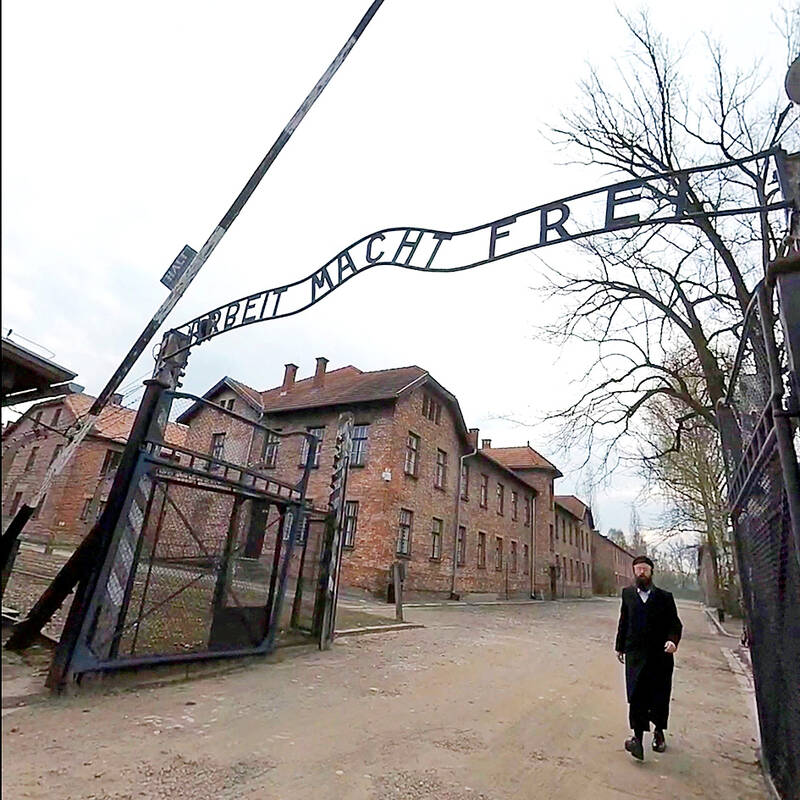Barbed wire lines the road to work for Pawel Sawicki, deputy spokesman of the Auschwitz museum at the site of the former Nazi death camp that was liberated 80 years ago. More than 1 million people died at the Auschwitz-Birkenau camp built by Nazi Germany when it occupied Poland in World War II — most of them Jews, but also non-Jewish Poles, Roma and Soviet soldiers.
About 850 people work at the museum to preserve their memory, a job with more emotional baggage than a usual nine-to-five.
“They say that when you start working here, either you leave very quickly because the history is too much or you stay for a long time,” said Sawicki, who is in charge of social media at the museum and has worked there for 17 years. “It helps if you find some meaning to the mission,” the 44-year-old said. Sawicki’s office is inside a former hospital for the Nazis’ notorious SS.

Photo: AFP
Behind the building, there is an old gas chamber and farther on stands the camp’s “Arbeit Macht Frei,” meaning “Work will set you free,” gate.
To cope with the heavy emotional toll of working at Auschwitz, Sawicki said he has put up “a sort of professional barrier” that keeps him sane, even if it cracks from time to time.
Jacek Paluch, a longtime Auschwitz tour guide, said he makes sure to leave his “work at work” to avoid going crazy, “but it’s a special job and a special place. It’s impossible to leave all the history behind and not take it home with you,” he said.

Photo: AFP
The 60-year-old said he leads up to 400 groups of visitors each year around the former death factory.
More than 1.8 million people visited Auschwitz last year. The museum offers tours of the site in more than 20 languages, led by around 350 guides. The hardest, most emotional moments for Paluch are his encounters with former prisoners.
Once, Paluch came across a man sitting silently — and unresponsive to questions — on a bench, his arm tattooed with his former inmate number. “His whole life, he never spoke a word to his family about what had happened here. Then, suddenly, at one Sunday breakfast, he began to talk,” Paluch said.

Photo: Reuters
“They stopped him and took him here so that he could tell his story where it happened... but when he walked through the ‘Arbeit Macht Frei’ gate, the memories came back. He went quiet again and no longer wanted to talk about any of it,” he said.
Paluch said he knows when the job has taken its toll.
“A sign of fatigue, not necessarily physical but more mental, is when I have dreams at night that I’m leading groups,” he said. “That’s when I realize I need to take some time off.”
Wanda Witek-Malicka, a historian at the museum’s research center, had for years focused on children inmates of Auschwitz, but she had to abandon the difficult subject when she became a mother.
“At that moment, this particular aspect of Auschwitz history — children, pregnant women and newborns — I was in no state to handle it,” she said.
Elsewhere at the site, conservator Andrzej Jastrzebiowski examined some metal containers once filled with Zyklon B, the poison gas used to kill inmates at Auschwitz.
He recalled his anger early on — he has worked at the museum for 17 years — when he had to conserve objects that had belonged to the Nazis. “Later, I realized these objects had importance as evidence of the crimes committed here, and maintaining them is also part of our mission here,” the 47-year-old said.
Jastrzebiowski and his colleagues at the high-tech conservation department are responsible for preserving hundreds of thousands of items, including shoes, suitcases, metal pots, toothbrushes, letters and documents.
Most of the items had belonged to inmates before being confiscated upon arrival. The conservators are also responsible for preserving the camp barracks, the barbed wire, the remnants of the blown-up crematoriums and gas chambers, and other ruins at the site.
It is work of utmost importance, especially at a time when the number of living former inmates is dwindling fast.
“Soon there will be no more direct witnesses to testify and all that will remain are these items, and they will have to tell the history,” Jastrzebiowski said. “Our job is to give them a voice.”
When he works on an item, he tries to discover the object’s peculiarities to keep the job from becoming a mindless routine.
“It helps me to think of the items’ owners, their stories,” he said.
“Most of all, it’s the opposite of what the Nazis had wanted — that their memory vanish, that they disappear forever,” he added.
International Holocaust Remembrance Day is on Monday next week.

Auschwitz survivor Eva Schloss, the stepsister of teenage diarist Anne Frank and a tireless educator about the horrors of the Holocaust, has died. She was 96. The Anne Frank Trust UK, of which Schloss was honorary president, said she died on Saturday in London, where she lived. Britain’s King Charles III said he was “privileged and proud” to have known Schloss, who cofounded the charitable trust to help young people challenge prejudice. “The horrors that she endured as a young woman are impossible to comprehend and yet she devoted the rest of her life to overcoming hatred and prejudice, promoting kindness, courage, understanding

US President Donald Trump on Friday said Washington was “locked and loaded” to respond if Iran killed protesters, prompting Tehran to warn that intervention would destabilize the region. Protesters and security forces on Thursday clashed in several Iranian cities, with six people reported killed, the first deaths since the unrest escalated. Shopkeepers in Tehran on Sunday last week went on strike over high prices and economic stagnation, actions that have since spread into a protest movement that has swept into other parts of the country. If Iran “violently kills peaceful protesters, which is their custom, the United States of America will come to

‘DISRESPECTFUL’: Katie Miller, the wife of Trump’s most influential adviser, drew ire by posting an image of Greenland in the colors of the US flag, captioning it ‘SOON’ US President Donald Trump on Sunday doubled down on his claim that Greenland should become part of the US, despite calls by the Danish prime minister to stop “threatening” the territory. Washington’s military intervention in Venezuela has reignited fears for Greenland, which Trump has repeatedly said he wants to annex, given its strategic location in the arctic. While aboard Air Force One en route to Washington, Trump reiterated the goal. “We need Greenland from the standpoint of national security, and Denmark is not going to be able to do it,” he said in response to a reporter’s question. “We’ll worry about Greenland in

PERILOUS JOURNEY: Over just a matter of days last month, about 1,600 Afghans who were at risk of perishing due to the cold weather were rescued in the mountains Habibullah set off from his home in western Afghanistan determined to find work in Iran, only for the 15-year-old to freeze to death while walking across the mountainous frontier. “He was forced to go, to bring food for the family,” his mother, Mah Jan, said at her mud home in Ghunjan village. “We have no food to eat, we have no clothes to wear. The house in which I live has no electricity, no water. I have no proper window, nothing to burn for heating,” she added, clutching a photograph of her son. Habibullah was one of at least 18 migrants who died